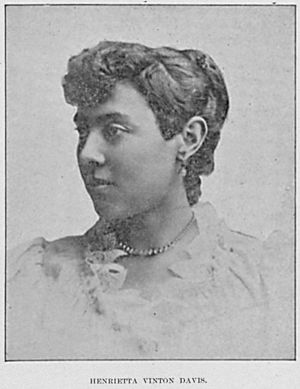Henrietta Vinton Davis facts for kids
Quick facts for kids
Henrietta Davis
|
|
|---|---|
 |
|
| Born |
Henrietta Vinton Davis
August 25, 1860 |
| Died | November 23, 1941 (aged 81) Washington, D.C., United States
|
| Occupation | Actress, elocutionist, dramatic reader, playwright, International Organizer of the UNIA, Vice President Black Star Line |
| Spouse(s) | Thomas T. Symmons |
Henrietta Vinton Davis (August 25, 1860 – November 23, 1941) was an amazing African-American actress, speaker, and writer. She was known as the best Black performer of her time. Marcus Garvey, a famous leader, even called her the "greatest woman of the Negro race today."
Davis worked closely with Marcus Garvey, who started the Universal Negro Improvement Association (UNIA). She held important leadership roles in the UNIA from its start in 1919 until the mid-1930s. At the first big UNIA meeting in 1920, she was chosen as the International Organizer. Later, she became the President-General of the UNIA, Inc. from 1934 to 1940.
Contents
Henrietta Vinton Davis: Her Life Story
Henrietta Vinton Davis was born in Baltimore, Maryland. Her parents were Mary Ann Johnson and Mansfield Vinton Davis, who was a musician.
Her Family
Henrietta's father died shortly after she was born. Within six months, her mother remarried to George A. Hackett. He was an important man in Baltimore and worked to protect free African Americans. He fought against a law that tried to enslave children of free Black people. After George Hackett died in 1870, Henrietta and her mother moved to Washington, D.C..
Her Education
Henrietta went to public schools to get her education.
Her Later Years and Burial
Henrietta Vinton Davis passed away on November 23, 1941, in Washington, D.C.. She was 81 years old. She was first buried in Columbian Harmony Cemetery. Later, in 1959, her remains were moved to National Harmony Memorial Park in Landover, Maryland.
Henrietta's Career Journey
Early Teaching Career
When Henrietta was only fifteen, she passed an exam and became a teacher in Maryland's public schools. After teaching there for some time, she moved to Louisiana to continue teaching. She later returned to Maryland to take care of her mother, who was ill.
Working in Administration
In 1878, when she was still a teenager, Henrietta became the first African-American woman to work for the Office of the Recorder of Deeds in Washington, D.C.. She worked as a copyist. In 1881, Frederick Douglass, a famous leader and family friend, became the Recorder of Deeds.
Drama and Stage Performances
In the early 1880s, Davis began taking lessons in speaking and acting. She learned from Marguerite Saxton in Washington. On April 25, 1883, Frederick Douglass introduced her to a large audience. She performed in many cities, including New London, Connecticut, New York City, and Boston.
She kept improving her acting skills by studying with famous teachers. She also attended the Boston School of Oratory.
Henrietta performed many different types of works. She acted in plays like Romeo and Juliet and As You Like It by William Shakespeare. She also performed works by Paul Laurence Dunbar and Mark Twain. She is considered the first African American woman to successfully perform Shakespeare after Ira Aldridge. In 1893, Davis started her own acting company in Chicago. She also traveled to the Caribbean. She even helped write a play called Our Old Kentucky Home.
Throughout her career, Davis acted in only four full-length plays: Damon and Pythias (1884), Dessalines (1893), Our Old Kentucky Home (1898), and Henri Christophe (1912).
Her Role in Political Activism
Davis supported the Populist Party and later the Socialist Party.
Leading the UNIA-ACL
Founding the Organization (1919-1920)
While traveling, Davis learned about the work of Marcus Garvey, who started a movement for people of African descent. On June 15, 1919, she spoke at a UNIA meeting in Harlem, New York City.
She performed a poem and used one of the first African-American dolls as a prop. She decided to stop her acting career to work with Garvey and the UNIA-ACL. In 1920, she was chosen as the UNIA's first International Organizer. She also served as the second Vice-President of the Black Star Line, a shipping company.
At the UNIA-ACL meeting in August 1920, she signed The Declaration of the Rights of the Negro Peoples of the World. This document stated that the colors red, black, and green would be the colors of the African race. It also demanded that the word "Negro" be written with a capital "N".
Growing Her Leadership (1921-1934)
In 1921, Davis became the fourth assistant President-General of the UNIA-ACL. She helped set up UNIA-ACL groups in places like Cuba, Guadeloupe, St. Thomas, Haiti, Trinidad and Tobago, and Jamaica. She was reelected in 1924. In December 1924, she traveled to Liberia, West Africa, as the only woman in a UNIA group. They hoped to start a UNIA-ACL community there. She also helped ask U.S. President Calvin Coolidge for support for Garvey. In 1925, she organized a trip through the Caribbean.
At the 1929 UNIA meeting, after Garvey had moved to Jamaica, Davis was elected UNIA Secretary General. By 1932, she became the first Assistant President General of a related UNIA organization. In 1934, she was elected as President of this group and served until 1940.
Her Lasting Impact
In 2014, a playwright named Carolyn Gage honored Henrietta Vinton Davis. Gage said that Davis knew that most classic plays were about white people. So, Davis supported new plays by Black writers. She produced and acted in plays about the successful slave rebellion in Haiti. She also co-wrote a musical called My Old Kentucky Home. Unlike other shows about plantations, Henrietta's play showed the war and formerly enslaved people taking over the plantation. Some people believe that because Henrietta was so far ahead of her time, her important role in Black theater history has sometimes been overlooked.
 | Sharif Bey |
 | Hale Woodruff |
 | Richmond Barthé |
 | Purvis Young |

